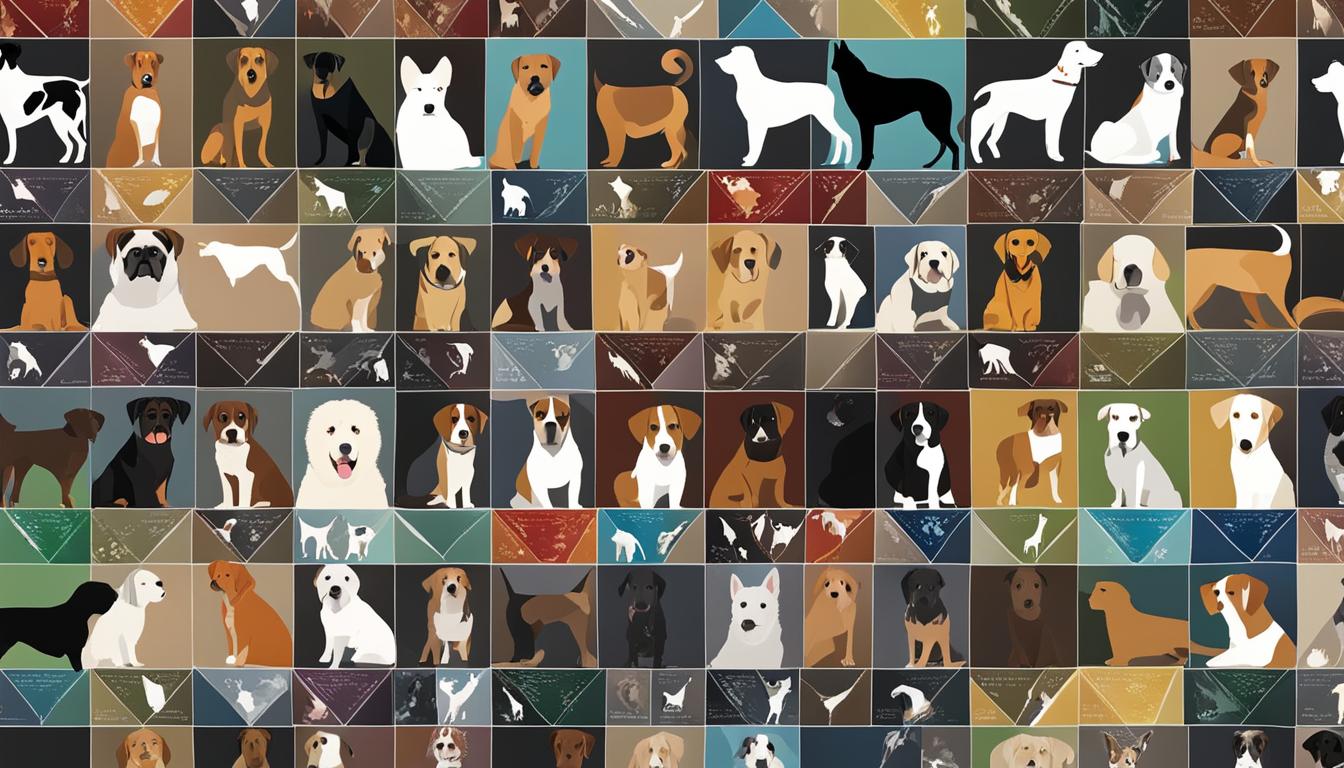When it comes to feeding our furry friends, one size does not fit all. Just like humans, dogs have unique nutritional needs based on their breed. So, why not give them the tailored nutrition they deserve? In this article, we’ll explore how breed-specific nutrient needs can be met through proper nutrition, whether it’s for large breed dogs, small breeds, mixed breeds, or toy breeds.
Key Takeaways:
- Large breed dogs may require joint support and lower caloric density to prevent rapid growth and bone issues.
- Small breed dogs often need diets with higher caloric density due to faster metabolisms.
- Mixed breed dogs have varying nutritional needs based on their genetic makeup, taking into account factors such as energy requirements and weight management.
- Toy breeds and brachycephalic dogs may benefit from specific nutrients in their diets to support their unique health concerns.
- Tailoring nutrition for athletic dog breeds involves providing the optimal balance of nutrients and calories to support their active lifestyle.
The Importance of Tailored Nutrition for Large Breed Dogs
When it comes to large breed dogs, providing them with tailored nutrition is of utmost importance. These majestic canines have specific dietary needs that must be met to support their overall health and well-being. From working dogs with high energy levels to giant breeds requiring special nutrients, understanding the nutritional requirements of large breed dogs is crucial.
One key consideration for large breed dogs is their caloric intake. To prevent rapid growth and potential bone issues, these dogs often require a diet with lower caloric density. This helps maintain a healthy weight and supports proper development. Additionally, large breed dogs are prone to joint issues, making joint health a top priority. Incorporating special nutrients like glucosamine and chondroitin into their diet can help support healthy joints and mobility.
Another important group of large breed dogs that requires tailored nutrition is working dogs. These hardworking canines, such as those involved in search and rescue or police work, have higher energy requirements. Their diets should be designed to provide adequate fuel for their active lifestyles and support their demanding physical exertion. Ensuring the right balance of nutrients, including proteins and fats, is essential to meet their unique needs.
| Special Nutrients | Benefits |
|---|---|
| Glucosamine and chondroitin | Support joint health and mobility |
| Enhanced protein and fat content | Provide energy for high activity levels |
Lastly, it is important to consider the nutritional requirements of senior large breed dogs. As dogs age, their dietary needs change, and they may require specific nutrients to support their aging bodies. Senior large breed dogs often benefit from diets that promote healthy aging, such as those containing antioxidants and joint-supporting ingredients. Consulting with a veterinarian can help determine the best nutritional plan for your senior furry friend.
By understanding and providing tailored nutrition for large breed dogs, we can ensure their health and well-being for a lifetime. Whether it’s adjusting caloric intake, incorporating joint-supporting nutrients, or meeting the energy needs of working dogs, a well-balanced diet plays a vital role in keeping our large breed companions happy and healthy.

One important consideration when it comes to small breed dog nutrition is the inclusion of specific nutrients that cater to their individual requirements. Toy breeds, for example, may benefit from added omega-3 fatty acids for healthy skin and coat, while brachycephalic breeds may require diets with lower sodium content to support heart health. These specific nutrients can address the unique health concerns that small breed dogs may be prone to, ensuring their long-term health and vitality.
As small breed dogs age, their nutritional requirements may change. Senior small breed dogs may require diets that are lower in calories to prevent weight gain and maintain a healthy body condition. Additionally, diets for senior small breed dogs should include ingredients that support joint health and cognitive function. Consulting with a veterinarian can help ensure that the nutritional needs of senior small breed dogs are met.
| Nutritional Considerations for Small Breed Dogs | Recommended Dietary Approach |
|---|---|
| Higher caloric density | Choose a small breed-specific dog food with a higher calorie content to meet their energy needs. |
| Specific nutrients for toy breeds | Look for diets with added omega-3 fatty acids and antioxidants to support their skin, coat, and overall health. |
| Nutritional considerations for brachycephalic dogs | Select diets with lower sodium content to support heart health and avoid ingredients that may exacerbate breathing difficulties. |
| Nutritional requirements for senior breeds | Choose diets that are lower in calories, include joint-supporting ingredients, and support cognitive function. |
In conclusion, meeting the nutritional needs of small breed dogs is essential for their overall health and well-being. By providing them with diets that cater to their unique requirements and consulting with a veterinarian, you can ensure that they receive the optimal nutrition they need to thrive throughout their lives.
Custom Diets for Mixed Breed Dogs
When it comes to mixed breed dogs, their nutritional needs can vary greatly depending on their genetic makeup. Customizing their diets is essential to ensure they receive the right balance of nutrients to support their health and well-being. Whether your mixed breed dog is large or small, young or senior, there are important factors to consider when tailoring their diet.
Factors to Consider for Mixed Breed Dogs
One of the key factors to consider for mixed breed dogs is their size. If your dog has larger breeds in their mix, they may have greater energy requirements and need a higher calorie intake. On the other hand, if your mixed breed dog has smaller breeds in their lineage, they may benefit from a diet with higher caloric density to support their faster metabolism.
Another important consideration is any potential health concerns associated with the different breeds in their mix. For example, some mixed breed dogs may be prone to joint issues or certain allergies. Custom diets can be formulated to address these specific needs, such as including ingredients that support joint health or are hypoallergenic.
Additionally, as mixed breed dogs age, their nutritional requirements may change. Senior mixed breed dogs may have different needs when it comes to calorie intake, protein levels, and joint support. Adjustments to their diet can help ensure they maintain optimal health as they enter their golden years.

| Factors to Consider | Dietary Recommendations |
|---|---|
| Size | Customize calorie intake based on energy requirements |
| Health Concerns | Incorporate ingredients that address specific health issues |
| Age | Adjust diet to support changing nutritional needs |
By considering these factors and working with a veterinarian, you can create a custom diet that meets the unique nutritional needs of your mixed breed dog. Providing them with the right balance of nutrients not only supports their overall health but also ensures they thrive and enjoy a happy, active life.
Feeding Strategies for Athletic Dog Breeds
Athletic dog breeds require specialized feeding strategies to support their high energy levels and maintain optimal performance. Proper nutrition is key to ensuring these active dogs have the stamina, muscle development, and overall health they need to excel in activities such as agility, flyball, and endurance sports.
One important aspect of tailored nutrition for athletic dog breeds is providing the right balance of nutrients and calories. These dogs have increased energy requirements compared to other breeds, so it’s essential to feed them a diet that meets their energy needs. Consider incorporating high-quality proteins, carbohydrates, and fats to provide the necessary fuel for sustained activity.
In addition to addressing energy requirements, special nutrients can play a role in supporting the specific needs of athletic dog breeds. For example, giant breed dogs may benefit from the inclusion of joint-supporting nutrients like glucosamine and chondroitin to promote healthy joints and prevent issues such as hip dysplasia. By providing these targeted nutrients, you can help to prevent injuries and support the overall well-being of your athletic dog.
Feeding strategies for athletic dog breeds may also involve portion control and meal timing. Ensuring that your dog has enough fuel before exercise can improve performance, while providing a balanced meal afterward aids in muscle recovery and replenishing energy stores. Consulting with your veterinarian and considering the specific needs of your dog’s breed and activity level can help you establish an effective feeding plan.
| Nutritional Considerations for Athletic Dog Breeds | Feeding Strategies |
|---|---|
| High energy requirements | Provide a diet rich in quality proteins, carbohydrates, and fats. |
| Joint support | Incorporate nutrients like glucosamine and chondroitin for giant breed dogs. |
| Portion control | Ensure appropriate portion sizes to prevent weight gain or loss. |
| Pre and post-exercise meals | Feed a balanced meal before and after physical activity to optimize performance and aid in muscle recovery. |
By tailoring your athletic dog’s nutrition to their specific needs, you can help them achieve their full potential in their chosen activities. Remember, the right balance of nutrients, portion control, and meal timing are essential factors to consider when developing a feeding plan for your athletic dog breed.
Conclusion
So there you have it! Tailoring nutrition to your dog’s breed-specific needs is key to ensuring their optimal health and well-being. Breed-specific dog food formulations have been specifically designed to address the unique nutritional requirements of different breeds, providing them with the tailored nutrition they need. Whether you have a large breed dog, a small breed dog, a mixed breed dog, or an athletic dog breed, there are customized diets available that can meet their specific needs.
When it comes to brachycephalic dogs, like Bulldogs or Pugs, it’s important to consider their particular nutritional considerations. These breeds often require special attention due to their unique anatomy and potential respiratory issues. By selecting the right diet, you can help support their overall health and quality of life.
As dogs age, their nutritional requirements change, and senior breeds have specific needs that must be met. It’s crucial to provide them with the right nutrients to support their aging bodies and maintain their well-being. By consulting with a veterinarian and choosing high-quality ingredients, you can ensure that your senior dog receives the nutrition they need to thrive.
Remember, choosing the right diet for your dog is an important decision that can have a significant impact on their health. By considering breed-specific dog food formulations, nutritional considerations for brachycephalic dogs, and the nutritional requirements of senior breeds, you’ll be well on your way to providing your furry friend with a diet that promotes their overall wellness. So go ahead, give your dog the tailored nutrition they deserve!
FAQ
What is breed-specific dog food?
Breed-specific dog food is formulated to meet the unique nutritional needs of different dog breeds.
What factors differentiate breed-specific dog foods?
Several factors differentiate breed-specific dog foods, including caloric density, protein and fat content, kibble size and shape, bone and joint support, calcium and phosphorus levels, and digestibility.
What are the nutritional needs of large breed dogs?
Large breed dogs may require lower caloric density, joint support nutrients like glucosamine and chondroitin, and tailored nutrition for working dogs and senior breeds.
What are the nutritional needs of small breed dogs?
Small breed dogs may require higher caloric density, specific nutrients for toy breeds and brachycephalic dogs, and adjusted nutrition as they age.
How should the diet be tailored for mixed breed dogs?
The diet should consider the size and potential health concerns of the different breeds in their mix, customizing nutrition for energy requirements, joint health, and weight management.
What feeding strategies are suitable for athletic dog breeds?
Feeding strategies for athletic dog breeds may include portion control, balanced nutrient profiles, and appropriate meals before and after exercise.





